



School of Behavioural Sciences was established in the year 2006 as teaching department offering M.Sc programme in Clinical & Counseling Psychology and Ph.D programme in the year 2007. The M.Sc programme envisages students with an understanding of the theoretical approaches and research methods applicable to both laboratory and real world settings. The curriculum thus emphasizes active learning, classroom interactions, field work that equips students to deal with the real settings. Students also participate in various community based service programmes. The department being a research centre, the students are exposed to research activities and studies and this helps to widen the student interest in research aspects. Apart from these, the department has been conducting extension activities for community welfare since long. Taken as a whole, the inputs from various resources have molded the students to become prospective professionals in the area.
I. Infrastructure facilities
- ICT enabled classrooms
The infrastructural facilities of School of Behavioural Sciences include classrooms with ICT enabled properties. There are two ongoing batches which functions simultaneously and the student strength in each batch is 20. The students are offered dual specialization in the area of clinical psychology as well as counseling psychology.
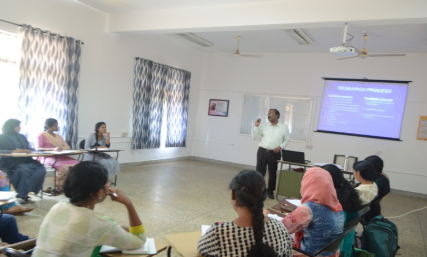
- Seminar Hall
Seminar hall of School of Behavioural Sciences is with smart classroom facilities. It has a seating capacity of 60 to 70 participants at a time. Programs related to curriculum and academic aspects of students, weekly seminars and activities organized by the departments are held in this hall. The same is also used for the pre submission and open defence in connection with the research programmes of the department. Workshops with limited number of participants were also convened in this hall.
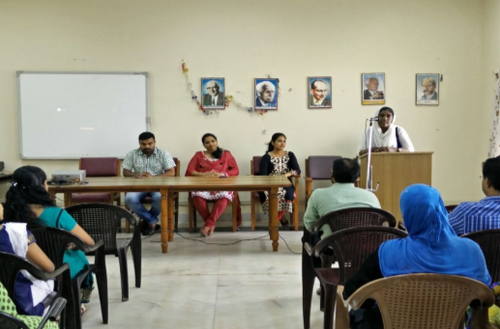
Apart from that, seminar hall is also used for providing yoga, relaxation and meditation training for the students as part of their practical training. .
- Experimental laboratory
To provide practical training on various domains of psychology, the department is equipped with a laboratory for experimental psychology. It is specifically designed for facilitating the practical training. The lab is equipped with 50 apparatus in prominent domains of psychology.
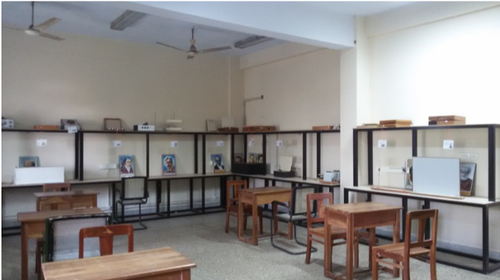
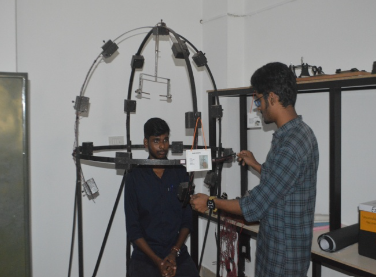
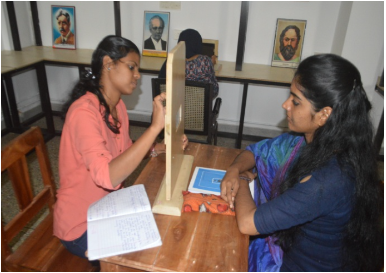
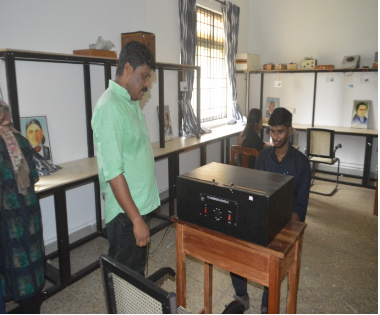
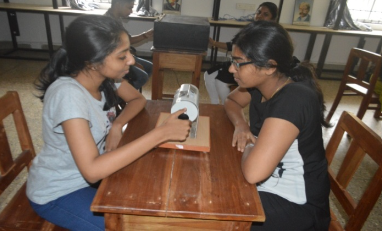
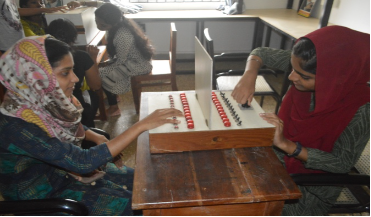
The lab includes sound gauge, phi phenomenon, reaction time, attention, memory drum- manual and electrical, depth perception, maze learning, kinesthetic figural after effect, mirror drawing, finger and tweezer dexterity, habit interference, ergograph, eye hand coordination, pain pressure spot test etc.
- Psychometric lab
Students can extent the theoretical basis to practical application by utilizing the well established psychometric laboratory. More than 130 nationally and internationally well known psychometric test materials are there in the lab which enables the students with an international level of exposure in psychometric testing. The same is used for doctoral and post doctoral research in the area of psychology.
The prominent scales which are used in lab are Wechsler adult intelligence test, Stanford Binet Intelligence scale for adult and children, 16 Personality Factors, Somatic ink blot test, Rorschach ink blot, California psychological inventory, MMPI-2, TAT, Hooper visual organization test, Neuropsychological assessment battery(NAB-SP), Neuro behavioural functioning inventory, Bender Gestalt test, ADHD, Gilliam Autism Rating Scale, Asperger’s Syndrome diagnostic scale, Differntial Aptitude Test, Learning Disability Diagnostic inventory, Dyslexia Screening test, Diagnostic reading battery, Resiliency scale, Vineland Adaptive Behaviour Scale, Novaco Anger scale, Taylor Johnson temperament Scale, Strong interest inventory, modern occupational skill test.
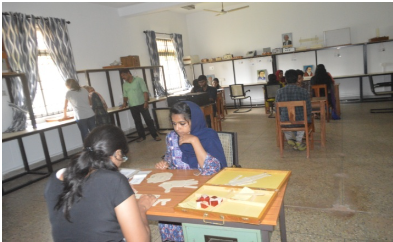
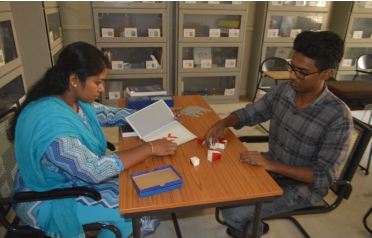
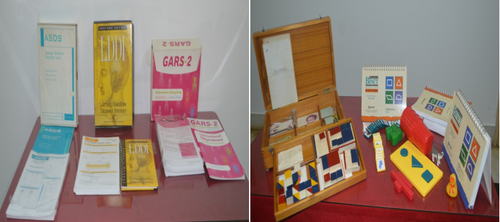
The psychometric lab provides test materials in the areas of intelligence, memory, personality, neuropsychological test, behavioural assessment, psychopathology test, aptitude, stress, emotion, wellbeing and resilience. Measures to screen out autism, learning disability and ADHD are available for the students to have practical exposure. Tests ranging from developmental issues to geriatric problems, adolescents issues to marital and sexual problems are accessible.
- Wellness Lab
M.Sc Clinical and Counseling Psychology students are given training on self development practices during their third semester. Importance was also given to train the students on their wellness. As part of it Biofeedback training has been provided to students with four measures – Alpha EEG Biofeedback “biotrainer”, Pulse biofeedback biotrainer, Respiration biofeedback trainer, GSR Biofeedback trainer. Bio feed back training for students.
In addition they were also trained in using BMI calculator, Multi behaviour Sex therapy unit, BP apparatus etc as part of the self development practices.
- Computer lab
To enable the students to have better access with the research publications and to meet the academic requirements, a fully functioning computer lab with 15 computers is available for the students and research scholars with internet connectivity.
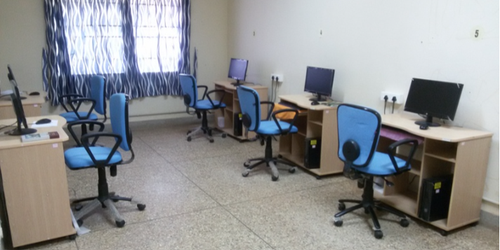
Students and researchers are also trained in SPSS and are used for their research dissertation as part of the academic requirements.
- Counseling / Psychotherapy room
In the view of aiding the students of to live more resourcefully, a centre for mentoring services was established since 2007. Trained faculties and researchers of the department offer counseling services for the students in need.
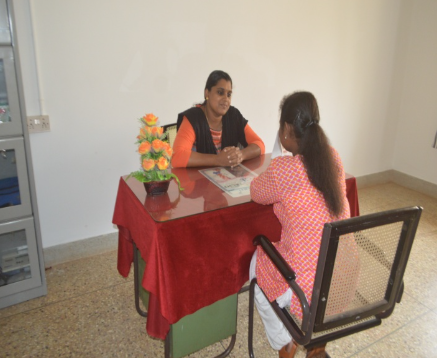
All the students in the campus can avail the facilities for their academic empowerment, personal problems, relationship issues, career plans, etc. An overall flourishing of the student community has been envisaged through the mentoring services.
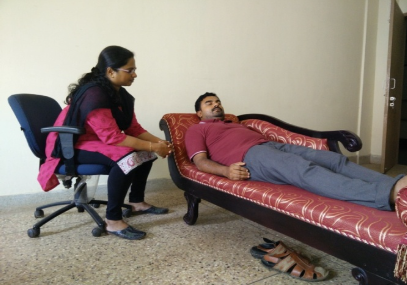
II. Instructional Facilities
- Faculty members
Instructional facilities are delivered by qualified faculty members. School of Behavioural Sciences have 4 assistant professors.
- Adjunct Faculties
In School of Behavioural Sciences, many faculties have been invited to deliver classes from time to time. The lectures have been delivered by subject experts from various universities during the period of 2006 -2019. Doubts and clarification arose during the lecture from the part of students have been cleared and explained by the external faculties.
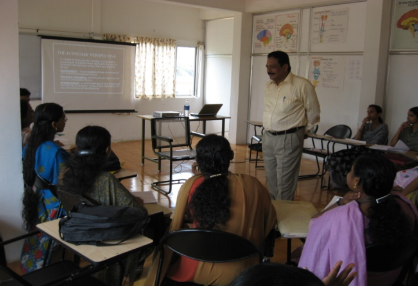
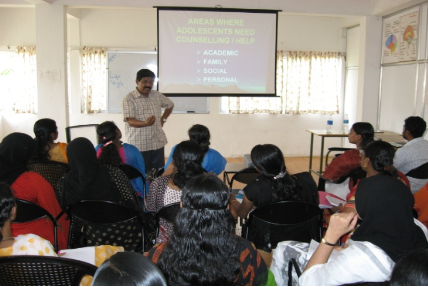
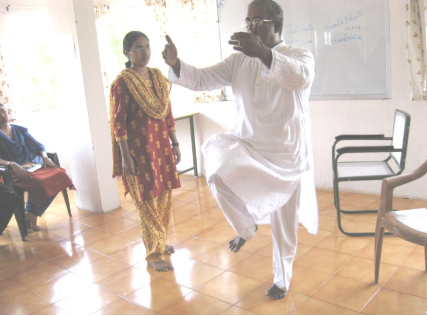
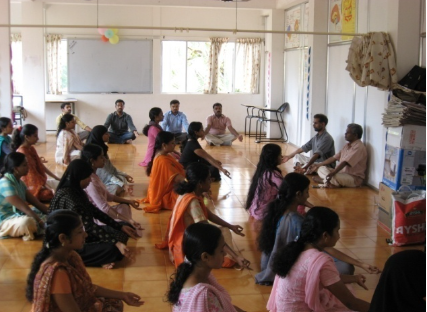
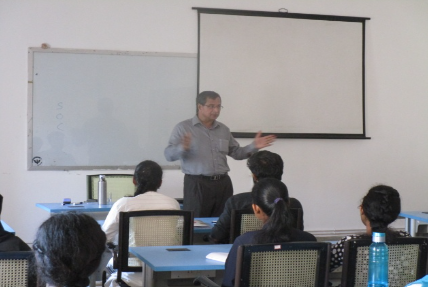
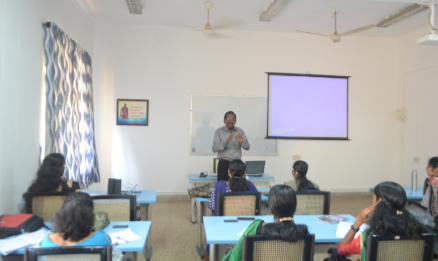
Providing classes on various subjects contribute to develop the knowledge on the part of students. This external/ adjunct faculty program helped flourish the knowledge of the students and gives an orientation about the various practices and approaches adopted in other universities.
- Post Doctoral Fellow
To continue the doctoral candidates training as a researcher and expand skills and experience post doctoral fellows are also at the department. M.Sc students can utilize their expertise in their specialized area which helps them prepare for their academic career.
- Research Scholars
Doctoral programme started in the year 2007 and is established as a full time research centre with all the required facilities. To the credit there are three Ph.D degrees so far awarded in the areas of learning disability, ADHD and physical disabilities. Two Ph.D theses have been submitted in the areas of REBT and Positive psychological interventions.
Besides, there are four research scholars (two full time and two part time) currently doing their research at the department. Research Scholars’ support to the post graduate students and department programmes are of greater significance.
- Administrative support
To provide students with better academic environment there are Assistant section officer, Lab assistant and part time sweeper. The scholarships, fellowships and other related administrative activities are carried out by Assistant section officer. The Lab assistant is in charge of the experimental, psychometric and computer labs.
- Ongoing activities for students
Orientation programme for students was commenced from the year 2017 for the newly admitted students with the support of IQAC, Kannur University.
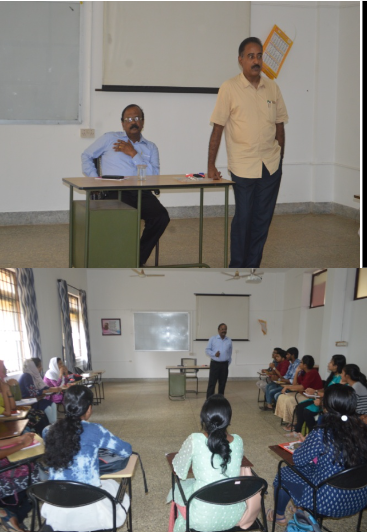
This is an ongoing programme conducted every year so as to enable the students to have an orientation about the curriculum. Soft skills training also conducted for the facilitation of students to have strong personal resources.